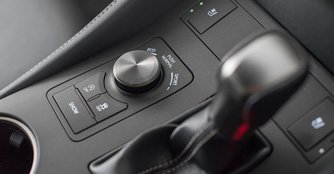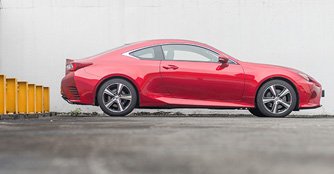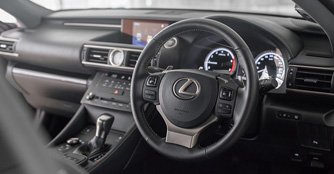Lexus RC Turbo 2.0 (A) Review
22 May 2017|28,330 views
What We Like
Handsome design
Refined powertrain
Reasonable fuel economy of 10.8km/l for a 2,170kg car
Nicely-crafted cabin
What We Dislike
Lacks the power and aural delivery of the RC350
2015 was a sad year for us car purists. It was the year, which saw Ferrari's halo 458 losing its screaming, naturally aspirated 4.5-litre V8 for a twin-turbocharged 4.0-litre, and renamed as the 488.
Two other premium manufacturers announced the introduction of turbocharging into their lineup to replace displacement, namely the Porsche 911 Carrera's new twin-turbocharged 3.0-litre flat-six in place of the old 3.4 and 3.8-litre units, and Lexus replacing the RC's 3.5-litre V6 unit for a turbocharged 2.0-litre four-pot.
But it seems Ferrari's and Porsche's turbo endeavours have proven our worst fears wrong, demonstrating that they too can excel with forced induced engines without compromising on driving pleasure. Question is... Can Lexus do the same?
Slower but steady
For starters, the RC Turbo shares the same engine as the IS Turbo. Its boosted four-pot churns a modest 241bhp and 350Nm of torque to the rear wheels by means of an eight-speed automatic. In comparison, the RC350 makes 312bhp and 378Nm.
The RC Turbo completes the century sprint in 7.5 seconds, 0.5 seconds slower than the IS Turbo. It's the consequence of the car's much heavier kerb weight, which measures 2,170kg. This makes the RC heavier than its BMW and Mercedes rivals.

While the RC Turbo doesn't excel in straight-line propulsion or provide the aural delight of the 350, its powertrain delivers super creamy performance. Magic from the turbocharger kicks in once you're past 2,500rpm, while gear shifts are quick, precise and unobtrusive.
For a car this heavy, the RC's returned fuel economy figure of 10.8km/L on our two-day drive is also respectable.
While not the best-in-segment in terms of driver involvement, the car does manage a sweet spot between comfort and performance handling in a way that sees it almost peerless. Steering feel is more natural than its Infiniti and Mercedes equals and it rides way more snugly than you'd presume of a flashy coupe.
Cabin insulation, too, ranks high on the luxury leaderboard. After all, it'd be silly to expect anything less from Toyota's luxury division.
Has Lexus worked the same magic on the interior?
While the RC Turbo lacks certain amenities you'd normally associate with a $248,000 car such as navigation, memory seats and a sunroof, it makes up for with cabin materials worthy of the term 'Japanese craftsmanship'.
For your money, you get palatial leather upholstery, ventilated seats that support just as well as they soothe, a user-friendly 7.0-inch infotainment system, dual-zone climate control, eight airbags, subtle ambient lighting and a reverse camera.
The exclusive artisan experience in the car, however, is best left for two in front, considering the two rear seats can accommodate young children at best.
So should we be crying about losing the RC350?
Not really. If you're one for the drive, there are nippier cars like the BMW M Series M240i Coupe for itch scratching.

But to remedy a bad day at work, to escape into the confines of a five-star personal space and relieving stress on a peaceful drive, the devlishly good-looking Lexus RC Turbo is a genuine gem.
What We Like
Handsome design
Refined powertrain
Reasonable fuel economy of 10.8km/l for a 2,170kg car
Nicely-crafted cabin
What We Dislike
Lacks the power and aural delivery of the RC350
2015 was a sad year for us car purists. It was the year, which saw Ferrari's halo 458 losing its screaming, naturally aspirated 4.5-litre V8 for a twin-turbocharged 4.0-litre, and renamed as the 488.
Two other premium manufacturers announced the introduction of turbocharging into their lineup to replace displacement, namely the Porsche 911 Carrera's new twin-turbocharged 3.0-litre flat-six in place of the old 3.4 and 3.8-litre units, and Lexus replacing the RC's 3.5-litre V6 unit for a turbocharged 2.0-litre four-pot.
But it seems Ferrari's and Porsche's turbo endeavours have proven our worst fears wrong, demonstrating that they too can excel with forced induced engines without compromising on driving pleasure. Question is... Can Lexus do the same?
Slower but steady
For starters, the RC Turbo shares the same engine as the IS Turbo. Its boosted four-pot churns a modest 241bhp and 350Nm of torque to the rear wheels by means of an eight-speed automatic. In comparison, the RC350 makes 312bhp and 378Nm.
The RC Turbo completes the century sprint in 7.5 seconds, 0.5 seconds slower than the IS Turbo. It's the consequence of the car's much heavier kerb weight, which measures 2,170kg. This makes the RC heavier than its BMW and Mercedes rivals.
While the RC Turbo doesn't excel in straight-line propulsion or provide the aural delight of the 350, its powertrain delivers super creamy performance. Magic from the turbocharger kicks in once you're past 2,500rpm, while gear shifts are quick, precise and unobtrusive.
For a car this heavy, the RC's returned fuel economy figure of 10.8km/L on our two-day drive is also respectable.
While not the best-in-segment in terms of driver involvement, the car does manage a sweet spot between comfort and performance handling in a way that sees it almost peerless. Steering feel is more natural than its Infiniti and Mercedes equals and it rides way more snugly than you'd presume of a flashy coupe.
Cabin insulation, too, ranks high on the luxury leaderboard. After all, it'd be silly to expect anything less from Toyota's luxury division.
Has Lexus worked the same magic on the interior?
While the RC Turbo lacks certain amenities you'd normally associate with a $248,000 car such as navigation, memory seats and a sunroof, it makes up for with cabin materials worthy of the term 'Japanese craftsmanship'.
For your money, you get palatial leather upholstery, ventilated seats that support just as well as they soothe, a user-friendly 7.0-inch infotainment system, dual-zone climate control, eight airbags, subtle ambient lighting and a reverse camera.
The exclusive artisan experience in the car, however, is best left for two in front, considering the two rear seats can accommodate young children at best.
So should we be crying about losing the RC350?
Not really. If you're one for the drive, there are nippier cars like the BMW M Series M240i Coupe for itch scratching.
But to remedy a bad day at work, to escape into the confines of a five-star personal space and relieving stress on a peaceful drive, the devlishly good-looking Lexus RC Turbo is a genuine gem.
Car Information
Lexus RC 300
CAT B|Petrol|13.7km/L
Horsepower
180kW (241 bhp)
Torque
350 Nm
Acceleration
7.5sec (0-100km /hr)
This model is no longer being sold by local distributor
All Used Lexus RC 300Thank You For Your Subscription.







































